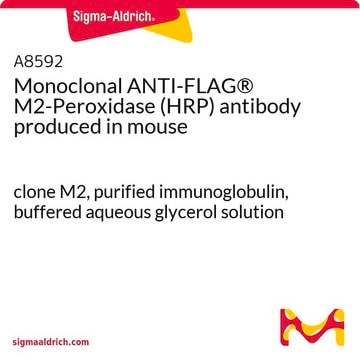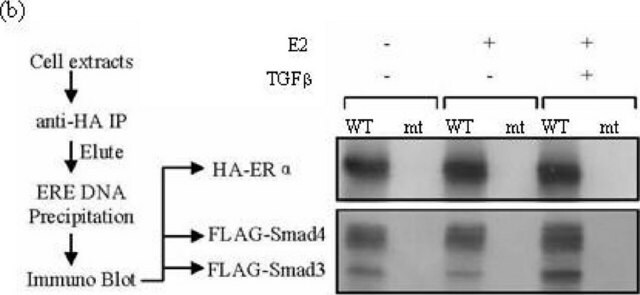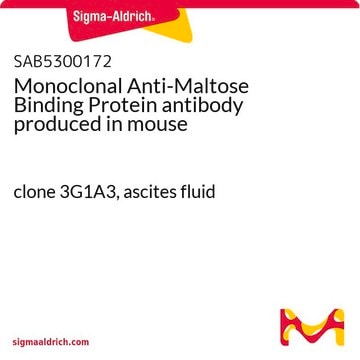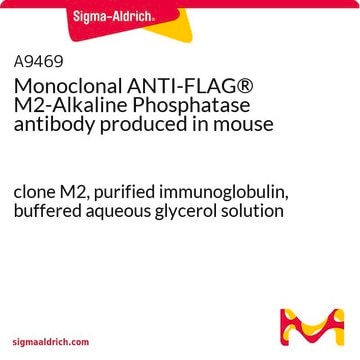The main application for Product F2555 rabbit monoclonal is for immunoblotting after immunoprecipitation with M2, which is a mouse antibody. This enables using a secondary antibody (anti-rabbit) that will not bind the M2 mouse heavy (50 kD) and light chains (25 kD).
F2555
Rabbit Monoclonal ANTI-FLAG® Clone SIGI-25
clone SIG1-25, ascites fluid
Sinonimo/i:
Anti-ddddk, Anti-dykddddk
Scegli un formato
502,00 €
Scegli un formato
About This Item
502,00 €
Prodotti consigliati
Origine biologica
rabbit
Livello qualitativo
Coniugato
unconjugated
Forma dell’anticorpo
ascites fluid
Tipo di anticorpo
primary antibodies
Clone
SIG1-25, monoclonal
tecniche
immunocytochemistry: 1:125-1:250 using transiently transfected cells expressing FLAG (sequence at the N-terminus)-tagged protein fixed with paraformaldehyde/Triton™ X-100
indirect ELISA: suitable
western blot: 1:250-1:500 using extracts of transiently transfected cells expressing FLAG (sequence at the N-terminus)-tagged protein
Isotipo
IgG
Sequenza immunogenica
DYKDDDDK
Condizioni di spedizione
dry ice
Temperatura di conservazione
−20°C
Categorie correlate
Descrizione generale
Specificità
Immunogeno
Applicazioni
Learn more product details in our FLAG® application portal.
Stato fisico
Note legali
Non trovi il prodotto giusto?
Prova il nostro Motore di ricerca dei prodotti.
Codice della classe di stoccaggio
10 - Combustible liquids
Classe di pericolosità dell'acqua (WGK)
WGK 3
Punto d’infiammabilità (°F)
Not applicable
Punto d’infiammabilità (°C)
Not applicable
Dispositivi di protezione individuale
Eyeshields, Gloves, multi-purpose combination respirator cartridge (US)
Scegli una delle versioni più recenti:
Certificati d'analisi (COA)
Non trovi la versione di tuo interesse?
Se hai bisogno di una versione specifica, puoi cercare il certificato tramite il numero di lotto.
Possiedi già questo prodotto?
I documenti relativi ai prodotti acquistati recentemente sono disponibili nell’Archivio dei documenti.
I clienti hanno visto anche
Contenuto correlato
Protein and nucleic acid interaction reagents and resources for investing protein-RNA, protein-DNA, and protein-protein interactions and associated applications.
Reagenti e risorse per lo studio delle interazioni tra proteine e acidi nucleici, come le interazioni proteina-RNA, proteina-DNA e proteina-proteina, e delle relative applicazioni.
-
Why should I use Product No. F2555, Monoclonal ANTI-FLAG® antibody produced in rabbit?
1 risposta-
Utile?
-
-
Is Product F2555 a monoclonal or polyclonal FLAG® antibody?
1 risposta-
F2555 is a monoclonal antibody, raised in rabbits. [Note: Nearly all of the monoclonal antibodies sold by Sigma-Aldrich are raised in mice.]
Utile?
-
-
What positive controls can be used for immunoblotting with Product F2555, Monoclonal ANTI-FLAG® antibody produced in rabbit - clone SIG1-25?
1 risposta-
Two of the FLAG-tagged proteins offered by Sigma-Aldrich are the Amino-terminal FLAG-BAP fusion protein (Product No. P7582) and the Carboxy-terminal FLAG-BAP fusion protein (Product No. P7457). Both of these proteins should work with the F2555 rabbit ANTI-FLAG.
Utile?
-
-
What is the Department of Transportation shipping information for this product?
1 risposta-
Transportation information can be found in Section 14 of the product's (M)SDS.To access the shipping information for this material, use the link on the product detail page for the product.
Utile?
-
-
Will Product No. F2555, Monoclonal ANTI-FLAG® antibody produced in rabbit - clone SIG1-25, recognize an internal FLAG tag protein?
1 risposta-
F2555 will recognize N-terminal and C-terminal FLAG fusion proteins.
Utile?
-
Filtri attivi
Il team dei nostri ricercatori vanta grande esperienza in tutte le aree della ricerca quali Life Science, scienza dei materiali, sintesi chimica, cromatografia, discipline analitiche, ecc..
Contatta l'Assistenza Tecnica.













